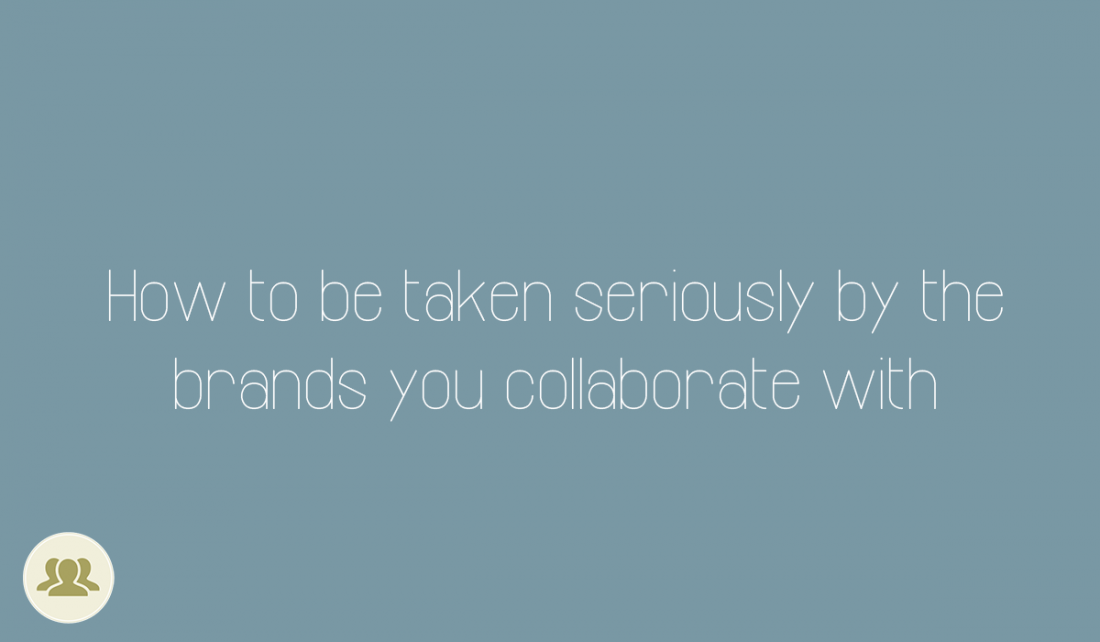Influencers are running their own businesses from their bedrooms, but many of us are continuously being paid late or being fobbed off by brands who owe us money for sponsored work. Julia Day, of The Independent Girls Collective (formally easy as VAT), asks how we can make sure we’re taken seriously by the brands we collaborate with.

Influencer marketing has created a whole new career path for many, and a way for brands to show off their products without paying the costly rates of TV or magazine advertising. It’s also more effective than digital advertising – ad blockers are on the rise and an increasing number of websites are choosing to simply remove ads from their pages.
Working with influencers benefits brands in so many ways; it allows them to target more specific audiences, gives them access to that person’s trusted following and comes across as far more authentic than advertising in a magazine.
While influencer collaborations are less expensive than traditional advertising, the payouts are still high for those who have worked to build a highly engaged, trusting audience, with reports of some earning up to £75,000 from a single sponsored post.
Yet scroll through Twitter and you’ll often see bloggers and social media stars bemoaning the fact that they’re still chasing payment of an invoice that was due to be paid three months ago.
If we’re providing so much value to brands, why are they so reluctant to pay us within a reasonable amount of time?
There are two main factors at play here. The first is that our strength, being an everyday person sharing their life online, is also our downfall. Nobody could have predicted that so many of us would be making careers out of posting about our new favourite mascara or what we’ve been buying from Primark. It’s incredible, but the fact that we’re a one-man operation means that we’re usually inexperienced in business and often not taken seriously.
The top dogs at companies know that influencer marketing is effective, but many of them don’t understand why, and don’t see us as legitimate professionals or understand the amount of work that goes into creating great content. They don’t see bloggers and YouTubers in the same light as traditional media, despite the fact that most consumers are more likely to buy a product recommended by a blogger than a magazine.
But is this partly our fault? Would this be as much of a problem if we acted more like business owners than inexplicably lucky people who’ve had opportunities thrown into our lap? The fact is, whether you started your blog, YouTube channel or social media account purely for fun or with the intention of making money from it, once you start being offered sponsored work, you’re running your own business. And I bet you’ve worked incredibly hard to get to this point.
So we need to give ourselves credit and own the fact that we’ve built a business. That means displaying confidence when interacting with brands and PRs, being aware of our rights when it comes to being paid and standing up for ourselves while remaining professional.
There’s also the issue of not wanting to appear money hungry,
or unrelatable to our followers. The reason blogging became popular was because it was normal people sharing their honest opinions, so if we start talking about how we’re making money through our channels we fear that it could call into question our integrity and alienate our followers.
But you don’t have to start talking business on social media to conduct yourself like a pro. Interactions with brands are generally held over email, so they’re private. It’s similar to how you behave at work; it’s probably different to how you act around your family and friends. And remember, your followers support you and are probably happy to see you doing well from your content.
Here are some tips for making sure the brands you collaborate with take you seriously and pay you on time.
Do your research
If you know someone who has already worked on a campaign with a brand you’re talking to, don’t be afraid to ask them how they found working with them. Most people are happy to share their experience and give others a heads up if there were any problems.
If they found the brand difficult to work with, or they had issues with not being paid on time, you may want to steer clear of working with them, or confirm payment periods before agreeing to any work.
Obviously mistakes do happen, so don’t write off working with the brand completely based on one negative experience if you really want to collaborate with them. But take on the work with your eyes open and be prepared to deal with any issues that may arise.
Confirm everything in writing
It’s easy to get so swept up in the excitement of a brand you love wanting to work with you that you forget about the legalities of protecting yourself when you carry out freelance work.
A written contract will protect you in the case of a brand not paying you or mistreating you in some way. It’s a legal document which both you and the brand will sign to agree on the work you’ll be doing and how much you’ll be paid.
Some brands will send you a contract to sign before you work with them, and if this is the case, make sure you actually read it before signing to avoid any nasty surprises. If a contract isn’t mentioned, you can send your own to the brand to sign and send it back to you before you work together. This is common practice, and a reputable company shouldn’t have a problem with it.
You can download free contract templates online. They don’t have to be really long or complicated, but they should include the business name and address of you and the brand, details of the work you’ll be doing and the amount you’ll be paid.
Keep it professional
The PR or contact for the brand you’re working with probably doesn’t have much control over when you get paid and is almost certainly not to blame for the situation, so while it’s reasonable to be upset about a payment being overdue, don’t take it out on them.
You can be assertive while remaining polite, so simply state the facts or make your request without bringing emotion into your emails. Kicking off, especially on social media, will not do you any favours, particularly if you’re hoping to continue to work with brands. It will also affect their view of working with influencers, which will impact others negatively.
Keep in mind that people do talk to others in their industry, just as we talk to other influencers, so the way you conduct yourself while working with them matters. If you’re a pleasure to work with, PRs are more likely to recommend you to their clients and other PRs. If you’ve been rude to the person you’re dealing with, they might warn others off working with you.
Be aware of your rights
Did you know that you can charge interest of 8% plus the Bank of England base rate on late payments? If a brand is messing you about, it’s certainly something to show that you’re aware of your legal rights as a business owner. If you decide to add interest to a late payment, you can send the brand or PR a new invoice which includes your original fee plus the interest.
You can also take legal action against a company that hasn’t paid you, however it’s worth keeping in mind that it’s a long process which will probably cost you more than the payment you’re chasing.
I always try to follow the advice above when collaborating with brands and so far I haven’t had any issues with late payments.
The reason influencers have a hard time getting paid on time comes down to brands not taking us seriously, so it’s important to show them that we are savvy business owners by acting professionally and being aware of our rights when it comes to completing sponsored work.
